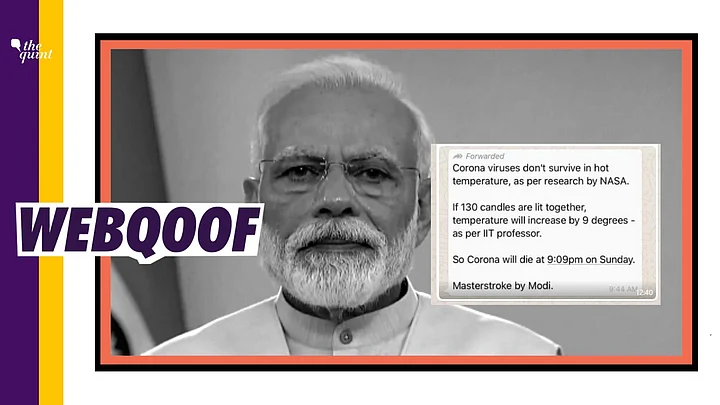Prime Minister Narendra Modi addressed the country via video message on Friday, 3 April. He urged citizens to light a candle/torch for 9 minutes at 9 pm the following Sunday.
Minutes later, posts about how the move will eliminate coronavirus were shared on social media and messaging platforms.
CLAIM
One such claim that has been doing the rounds says burning candles will produce heat and thus, raise the temperature and kill coronavirus.
“Coronavirus don’t survive in hot temperature, as per research by NASA. If 130 candles are lit together, the temperature will increase by 9 degrees - as per IIT professor.So corona will die at 9.09 pm on Sunday. Masterstroke by Modi,” the claim reads.
TRUE OR FALSE?
The Quint can confirm that there is no truth to this claim. First, it is not possible to gauge the rise in temperature because of lighting candles until we know the candles’ dimensions. Second, that heat can kill coronavirus is a much-debated notion.
The viral message makes two claims. Let’s take a look.
CAN CANDLES INCREASE THE TEMPERATURE?
The Quint reached out to Abdul Ali, a research scholar at IIT-Bombay. Abdul told us it isn’t possible for 130 candles, as mentioned in the claim, or even more to be able to increase the temperature by 9 degrees.
“The temperature change due to burning of a substance can be calculated by using the formula, q=nmCDT, where q is the heat energy, n is the number of candles, m is the mass, c is the specific heat of the candle and dt is the change in temperature. In this case, all of these dimensions are not known since every candle will vary in weight and size. However, even in ideal conditions, the claim stands no ground,” he said.
Further, the claim that high temperatures will kill coronavirus is in itself dubious. World Health Organisation (WHO) has categorically said ‘no matter how sunny or hot the weather is’ a person can catch coronavirus.
WILL AN INCREASE IN TEMPERATURE KILL CORONAVIRUS?
Some early studies claimed that the spread of coronavirus may slow down with higher temperatures, however, researchers and epidemiologists have questioned the approach.
Speaking to India Spend, an epidemiologist from Indian Council of Medical Research said how other viruses have reacted to temperature in the past may not hold true for the novel coronavirus.
Quint FIT too reached out to Prof K Srinath Reddy, president of PHFI (Public Health Foundation of India) who said coronavirus does get impacted by variation in temperature but this behaviour is restricted only to certain strains of the microorganism.
“Other coronaviruses have been shown to show seasonal variations, subsiding in summer heat. We do not know if this new entrant to the group will behave similarly or be a deviant ‘enfant terrible’.”Prof K Srinath Reddy, President, PHFI
Dr Sunil Arora, Secretary of FORDA (Federation of Resident Doctors’ Association) hold the opinion that the behaviour of the virus outside human body is ‘unpredictable’. He further added that 'not many studies are available on the effect of temperature on the virus itself and researchers are trying their level best to establish a correlation’.
Further, the fact-checking wing of the Press Information Bureau (PIB) has also denied it.
Evidently, a misleading message has been circulated with a claim that burning candles on 5 April will kill the virus. But the message is not backed by facts.
You can read all our fact-checked stories on coronavirus here.
(Not convinced of a post or information you came across online and want it verified? Send us the details on WhatsApp at 9643651818, or e-mail it to us at webqoof@thequint.com and we'll fact-check it for you. You can also read all our fact-checked stories here.)
(At The Quint, we question everything. Play an active role in shaping our journalism by becoming a member today.)
